八年级英语上册unit2第二课时教案新部编本
Module1Unit2第二课时学历案八年级英语上册

(3).To forget new words is natural.
It_____natural_____ _______new words.
(4).学好英语是重要的。___________________________________________.
(5).学好英语对我们来说是重要的___________________________________.
评价任务
评价标准
学习效果
能正确运用natural
A能自主完成以上5个习题
B能自主完成至少3个习题
(3)老师让汤姆早点。
____________________________________
(4)一些学生经常向父母要钱玩电脑游戏。____________________________________
(5)他向父母要一辆自行车作为生日礼物。____________________________________
(3).我想我会建议他离开那家工厂。
I think I’d _______ him _________ the factory.
(3).我的朋友建议我去北京旅游。
______________________.
(5).我妈妈建议我不要玩电脑游戏。
____________________________.
Step 2Read for learning
Language points(读后学)
1.Many students ask for advice about how to improve their English.许多学生询问关于如何提高他们英语的建议。
北师大版英语八年级上册Unit2Lesson4ClassProjects(第二课时)优秀教学案例

(四)反思与评价
1.在教学过程中,我将引导学生进行自我反思和评价。例如,我可以让学生思考自己在项目完成过程中的表现,以及他们认为可以改进的地方。通过自我反思,学生可以更好地了解自己的学习状况,提高自我调整能力。
在教学过程中,我将注重激发学生的学习兴趣,培养学生主动参与课堂的意识。通过设置真实的学习情境,让学生在实践中掌握语言知识,提高语言运用能力。同时,我将引导学生运用合作学习策略,培养他们的团队协作精神,使他们在完成项目的过程中,提高自身的综合素质。
在教学评价方面,我将采用形成性评价和终结性评价相结合的方式,对学生的学习过程和成果进行全面评价。通过评价,帮助学生发现自己的不足,激发他们的学习动力,促进他们的全面发展。在整个教学过程中,我将遵循教育教学规律,以学生为中心,关注学生的个体差异,尊重他们的主体地位,充分发挥教师的主导作用。
2.此外,我还会组织学生进行同伴评价和教师评价。通过他人的评价,学生可以从不同角度获得反馈,提高他们的自我认知能力。
3.反思与评价的教学策略可以帮助学生形成持续反思的习惯,培养他们的自我评价和自我改进能力。
四、教学内容与过程
(一)导入新课
1.在导入新课环节,我会通过一个真实的情景来吸引学生的注意力。例如,我可以展示一段关于一个成功项目的视频,让学生思考项目成功的关键因素是什么。
(二)问题导向
1.在教学过程中,我将提出一系列问题,引导学生进行思考和讨论。例如,我可以问学生:“你们认为在完成一个项目时,最重要的是什么?”或者“你们如何分配任务和责任?”等问题。通过问题的引导,学生可以深入思考项目完成的关键要素,提高他们的思维能力。
新Unit2第二课时(SectionA grammar focus-3c)1审

Grammar Focus
Mark the auxiliary verbs before the subjects in the left column.
What do you usually do on weekends?
at least为固定短语,意为“至少;不少于;起码”,反 义短语是at most,意为“至多;不超过”。
➢Teenagers need to sleep at least 8 hours every day. ➢You can borrow at most three books once.
3b Use the words given to write questions.Then ask and
times a month.
频度副词的位置
频度 副词
实义动词之前 ➢She always goes to school by bus.
be动词、助动词、情态动词之后 ➢I’m always happy to see her. ➢I can never forget it.
有时为了强调,频度副词也可位于句首。 ➢ Sometimes he goes to work by bus.
What do you usually do on weekends?
I always exercise.
What do they do on weekends? They often help with housework.
What does she do on weekends? She sometimes goes shopping.
加 -es
Module 1 Unit 2 I like swimming. 教案新部编本2
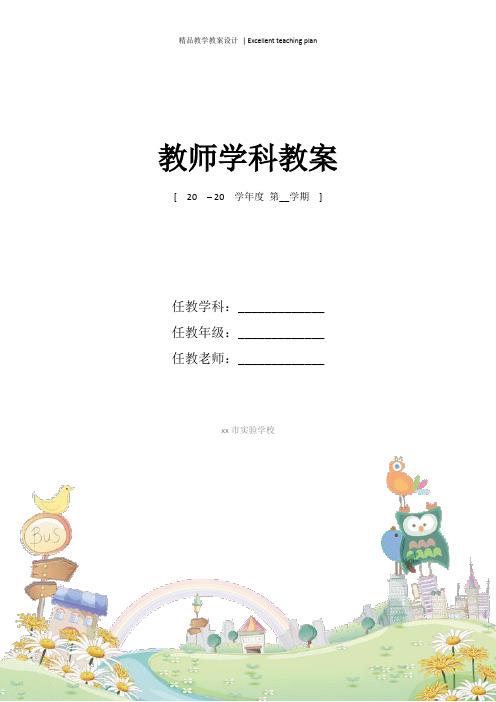
教师学科教案[ 20 – 20 学年度第__学期]任教学科:_____________任教年级:_____________任教老师:_____________xx市实验学校Module 1Unit 2 I like swimming.教案2一、教学目标1、能够听,说,读,写句型:What’s your hobby? I like swimming. He likes playing basketball. What do you like doing?2、能够在实际情景中正确运用所学句型表述自己的爱好及他人的爱好。
二、教学重难点1、本课时的教学重点是like+doing句型的掌握。
2、本课时的教学难点是在实际情景中正确运用句型:He/She likes….3、掌握本单元所学单词以及词组三、课前准备1、ppt以及教案2、课文录音3、三幅挂图四、教学具体安排Step1: Warming-up1.教师和学生一起唱响学生已经学过的英语童谣。
(设计说明:上课伊始,师生共唱一首英文歌曲,学生在轻松的学习氛围中放松心情,创造了英语学习的氛围。
)2.唱歌过后,教师和学生就“天气”为主题,做简单的Free Talk。
(设计说明:只有通过师生、生生之间大量的语言交流,才能培养学生用英语交际的能力。
课堂上的Free Talk是培养学生听说能力的有效方式。
教师要多给学生赏识性的语言,鼓励学生多说,敢说,乐说。
)Step 2:Presentation1.教师请几名学生到讲台前来当小小气象播报员,为全班同学播报全国各个主要城市和当地的天气情况,如“It’s sunny in Beijing. It’s warm here…”。
2.教师对同学们说Damming正在和一个外国的小朋友聊相同的话题,我们一起去听听他们的对话吧!3.教师把本单元活动1的教学挂图呈现给学生,让学生看图听录音。
4.教师再放录音,让学生边听边看书,同时用笔勾画出课文中的生词和词组,并让学生根据前后文,猜猜每个生词和词组的意思。
八年级英语Unit2Howoftendoyouexercise教案

Unit 2 How often do you exercise?课时教学设计第一课时Section A (1a-2d)1.通过看图说话、师生问答、听录音、角色扮演等形式,掌握本课时的housework,Internet,program,full,swing这几个词汇和hardly,ever,hardly ever,once,twice 这几个频度副词和短语。
2.通过师生问答、角色扮演、调查采访、做游戏等形式,学会“How often…?”“Iusually…”等句子结构,并能用之谈论、描述自己或他人的业余活动,同其他人交流与业余活动有关的信息,谈论自己或他人进行某项活动的频率。
重点使学生掌握与业余活动相关的英语词汇及本课时的句型“What do you usually do on weekends?”“I always exercise.”“How often do you…?”“I…once a week.”让学生了解世界上其他国家人们的业余活动情况。
难点让学生运用所学语言项目How often do you…?谈论自己或他人的业余活动及其频率。
Step 1 情景导入通过师生自由交际进行复习与热身。
让学生回忆关于业余活动的词汇,例如watch TV, read books,exercise, go shopping,go to the movies等。
通过师生谈论自己的业余活动,调动学生对本课话题的学习兴趣,同时实现新旧知识的衔接,巩固已学知识,并引出本节课的学习话题。
For example:T:What do you usually do on weekends?S1:I usually help with housework.S2:I usually play basketball with my friends.S3:I usually go shopping.T:Do you usually go shopping on weekends?S1:Yes,I do.T:So do I.S2:OK.After class we'll go shopping.T:Do you usually watch TV on weekends?S3:No,I don't. I usually read a book.…(设计意图:本环节通过回忆以前学过的词汇进行课前热身,让学生打开记忆的大门,快速激活已有的知识库存,为下一环节的学习奠定基础。
八年级英语上册:Unit 2 Topic 2Section A
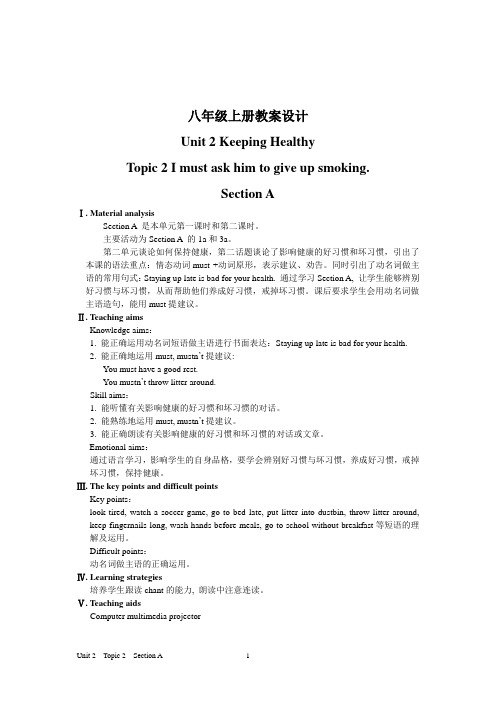
八年级上册教案设计Unit 2 Keeping HealthyTopic 2 I must ask him to give up smoking.Section AⅠ. Material analysisSection A 是本单元第一课时和第二课时。
主要活动为Section A 的1a和3a。
第二单元谈论如何保持健康,第二话题谈论了影响健康的好习惯和坏习惯,引出了本课的语法重点:情态动词must +动词原形,表示建议、劝告。
同时引出了动名词做主语的常用句式:Staying up late is bad for your health. 通过学习Section A, 让学生能够辨别好习惯与坏习惯,从而帮助他们养成好习惯,戒掉坏习惯。
课后要求学生会用动名词做主语造句,能用must提建议。
Ⅱ. Teaching aimsKnowledge aims:1. 能正确运用动名词短语做主语进行书面表达:Staying up late is bad for your health.2. 能正确地运用must, mustn’t提建议:You must have a good rest.You mustn’t throw litter around.Skill aims:1. 能听懂有关影响健康的好习惯和坏习惯的对话。
2. 能熟练地运用must, mustn’t提建议。
3. 能正确朗读有关影响健康的好习惯和坏习惯的对话或文章。
Emotional aims:通过语言学习,影响学生的自身品格,要学会辨别好习惯与坏习惯,养成好习惯,戒掉坏习惯,保持健康。
Ⅲ. The key points and difficult pointsKey points:look tired, watch a soccer game, go to bed late, put litter into dustbin, throw litter around, keep fingernails long, wash hands before meals, go to school without breakfast等短语的理解及运用。
Module6Unit2第二课时学历案八年级英语上册
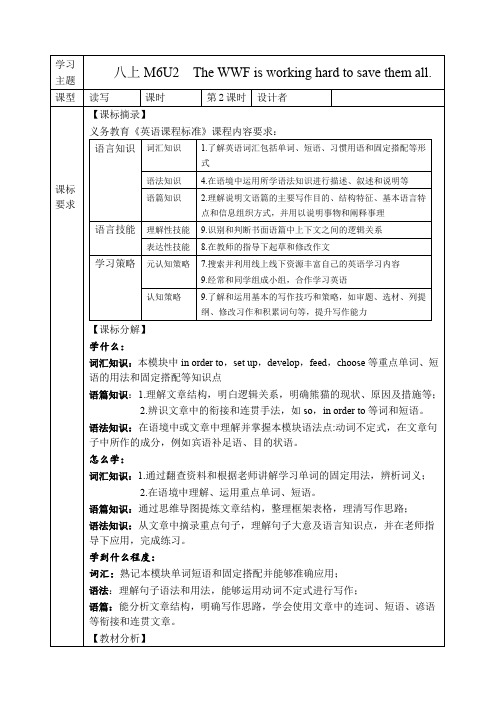
评价任务评价标准学习效果结合思维导读,完成文章复述(指向目标1)全部正确A4个及以下错误B 5个及以上错误C根据第一课时学习,复述语篇内容【达标检测】答案:1.根据句意及所给提示填空。
(1) to protect (2) to hear (3) to feed (4) to save (5) to eat2.翻译句子。
(1) In order to stay healthy,my father walks to work every day./My father goes to work on foot every day in order to keep fit.(2)There are some students reading books in the classroom.(3)He set up a shop last year to make more money.3.plete the sentences.(1)to help pandas produce more babies and help baby pandas live(2)to protect pandas in the wild(3)to be its symbol(4)to save all the animals4.plete the sentences with the words in the box.(1) Scientists (2) produce (3) baby (4) situation (5) government (6) save (7) nature (8) symbol【课后作业】答案:II.写作Tigers are in dangerTigers are big and strong.They have big and bright eyes.They have beautiful orange fur with dark stripes.Tigers can run very fast.They are also good at swimming.They like to livealone when they grow up,and they feed on other animals.There aren’t many tigers living in the wild.We must take action to protect them right now.The government should make more laws to protect tigers.We shouldn’t buy anything made of tigers either.III.适当形式填空1. has2.first3.elephant’s4.well5.working6.Cows7.their8.triesually 10.interesting。
人教版八年级英语上册教材Unit2 教案
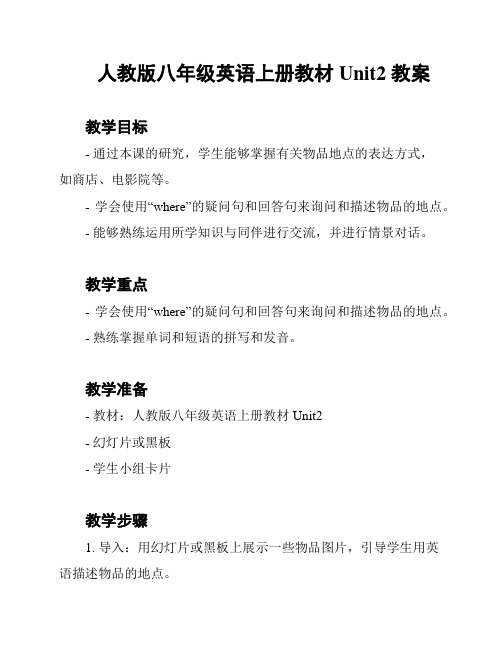
人教版八年级英语上册教材Unit2 教案
教学目标
- 通过本课的研究,学生能够掌握有关物品地点的表达方式,
如商店、电影院等。
- 学会使用“where”的疑问句和回答句来询问和描述物品的地点。
- 能够熟练运用所学知识与同伴进行交流,并进行情景对话。
教学重点
- 学会使用“where”的疑问句和回答句来询问和描述物品的地点。
- 熟练掌握单词和短语的拼写和发音。
教学准备
- 教材:人教版八年级英语上册教材Unit2
- 幻灯片或黑板
- 学生小组卡片
教学步骤
1. 导入:用幻灯片或黑板上展示一些物品图片,引导学生用英
语描述物品的地点。
2. 研究新知:通过教材Unit2的相关内容,教授目标词汇和短语,让学生理解并记忆。
3. 练活动:进行对话练,学生分组,每个小组选择一个物品进行情景对话,询问和回答物品的地点。
4. 拓展活动:让学生运用所学知识,创造自己的对话,交流物品的地点。
5. 归纳总结:让学生回顾所学知识,进行总结归纳。
6. 作业布置:布置课后作业,要求学生练复述本课内容,并使用疑问句和回答句描述物品地点。
教学评价
- 通过学生的课堂表现、练活动和讨论活动来进行评价,检查学生是否能够正确运用所学语言进行物品地点的描述。
- 提供及时的反馈,鼓励学生用英语进行交流。
注意事项
- 确保课堂秩序,引导学生积极参与。
- 注重学生的口语能力培养,鼓励他们进行对话练。
- 提供足够的练机会,让学生熟练掌握所学知识。
以上为人教版八年级英语上册教材Unit2的教案,根据课堂实际情况适当调整教学步骤。
八年级英语北师大版上册册Unit2Lesson4ClassProjects(第二课时)优秀教学案例

1.培养学生对英语学习的热情,使他们感受到学习英语的乐趣,增强自信心。
2.教育学生学会尊重他人,培养良好的团队合作意识,学会分享与互助。
3.通过本节课的学习,使学生认识到学习英语的重要性,提高他们对英语学科的重视程度。
在教学过程中,教师要关注每个学生的个体差异,充分调动他们的学习积极性,使他们在课堂活动中能够充分发挥自己的潜能。同时,教师要以鼓励性评价为主,注重培养学生的自主学习能力,帮助他们建立良好的学习习惯,为他们的终身学习奠定基础。
3.小组合作:本节课通过小组合作完成项目任务,培养了学生的团队合作精神。每个小组选择一个项目任务,分工合作,共同完成。这种小组合作的方式不仅提高了学生的团队合作能力,还使他们能够更好地运用所学知识解决实际问题。
4.反思与评价:教师引导学生对自己在小组合作中的表现进行反思,如:"What did you learn from this project?" "What can you improve?"这种反思与评价的方式使学生能够更好地了解自己的学习情况,找出不足之处,从而促考并回答,如:"What did you do yesterday?" "Were you visited by someone yesterday?"
2.通过问题引导学生运用一般过去时的被动语态进行回答,如:"Yes, I was visited by my friend yesterday."
3.能够通过听、说、读、写的训练,提高学生的英语综合运用能力。
(二)过程与方法
1.通过小组合作完成项目任务,培养学生的团队合作精神,提高他们的沟通协作能力。
2.运用任务型教学法,引导学生参与课堂活动,激发他们的学习兴趣,提高学习积极性。
初中八年级英语Unit2 教案+说课稿 人教新目标版
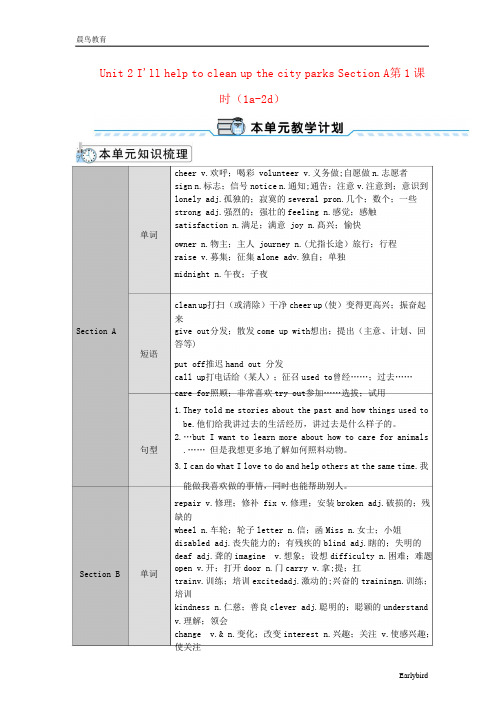
Unit 2 I'll help to clean up the city parks Section A第 1 课 时(1a-2d)
单词
cheer v.欢呼;喝彩 volunteer v.义务做;自愿做 n.志愿者 sign n.标志;信号 notice n.通知;通告;注意 v.注意到;意识到 lonely adj.孤独的;寂寞的 several pron.几个;数个;一些 strong adj.强烈的;强壮的 feeling n.感觉;感触 satisfaction n.满足;满意 joy n.髙兴;愉快
to ask them to protect our earth.
A. printing out B. giving out
C. selling out
D. putting out
活 3.(黑龙江绥化中考)—My aunt goes to climb mountains every Sunday.
B
(
3a
~
3b)……………………………………………………………………………………1课时
词汇短语:主要采用图片及多媒体展示助记法。 基本句子:采用多媒体展示及交际法(利用多媒体展示两人进行交际时的情景)。 语法:动词不定式——采用图标记忆法。
Section A 第一课时(1a~2d)
类别 重点单词
学习重点 cheer, volunteer, sign, notice, lonely
Earlybird
晨鸟教育
sir n.先生(用于正式信函中对不知名的男性收信人的称呼时,写 为 Sir) madam n.夫人;女士(用于正式信函中对不知名的女性收信人的称
呼时,写为 Madam)
教案新部编本—《Unit 2 my family》

教师学科教案[ 20 – 20 学年度第__学期]任教学科:_____________任教年级:_____________任教老师:_____________xx市实验学校教案—《Unit 2 my family》Unit 2 my familyLesson oneTeaching aims:1. Knowledge aims:a. Learn the sentences: who’s that man(boy)? He’s my…who’s tha t woman(girl)? She’s my ….b. Learn the sentences: This is ……He /She is.......2. The target of skills:a. Master the words and sentences.b. Can introduce one’s family using the words and sentences learned in this lesson.3. The target of emotion:To inspire the students' interest of learning English and love their family.Teaching main difficult points:Main points: the new words and sentences.Difficult points:The pronunciation of the new words,talking about the family.Teaching aids:Prepare some family members cards,family photosTeaching procedure:1.Warm-up:a.Greetings :T:Good morning, boys and girls!S:Good morning, Miss Yang.T:How are you?S:Fine,thank you.T:I’m from china.Where are you from?S:I’m from ….T:Nice to meet you.S:Nice to meet you ,too.b.Let’s do:A A A,Say “OK”.2. Presentation(1). To review the words of father and motherShow the word cards: father,Mother,man,woman.(2)Show the picture of Chenjie.T:Look! Who’s that girl? Do you know? Oh,She’s Chenjie.She’s my friend.Now,Read after me.“She’s Chenjie.She’s my friend”Write “she’s”on the biackbord.(3)Show the picture of Mike.T:Look! Who’s that boy?Can you know? Oh,He’s Mike.He’s my friend.Now,Read after me.“He’s Mike.He’s my friend”Write “He’s”on the b iackbord.(4)Point to all the class ask: who’s that boy? He’s …who’s that girl? She’s ….(5)Show the picture of teacher.T: Who’s that woman? Who’s that man?S: She’s Miss….He’s Mr….(6)Show the photo of family.T: This is my family .she is my mother.He’s my father.(repeat words mom and dad)Now open your book,turn to page 14.look at these sentences.poin to the sentences.Listen talk,read talk.3.practice:(1) Who’s family is this?Show the student’s photo ask: Who’s family is this?S:This is my family.T:Can you introduce your family?S:Sure. This is my family. she’s my mother. He’s my mother.(Go on, students between students ask and answer.)(2)Magic ears.First, student close his eyes,another student say English .First student guess: He’s…./She’s….(3)sing and songDo you love your family? All right,Let’s sing《father and mother》.T:Class 3 grad 3 is a big family,We are all the members of this family,Please love eatch other and help eatch other.Extensiona.listen and read talk.b. Can intro duce one’s family using the words and sentences learned in this lesson.Blackboad—writing designUnit 2 My familyPart A Let’s talkWho’s that woman?She’s ….Who’s that man?He’s….。
人教八年级英语上Unit2(共6课时)二次备课教学设计

Unit 2How often do you exercise?第一课时Section A (1a~1c)类别课时要点—No, I never go shopping. 不,我从不购物。
§自主学习案写出下列单词。
总是always有时候sometimes通常usually从不never经常often§课堂导学案Step 1准备与热身(Preparation)Good morning! Today we shall take up the second unit in this new term: Unit 2 How often do you exercise? Please open your books at page 9.T: Look at picture a.What is she doing?S1: She is going shopping.T: Do you usually go shopping?S2: No, I don't.T: What do you do on weekends?S3:I often play football.T:What do you do on weekends?S4:I sometimes go shopping.Step 2呈现与输入(Presentation)Open your book at page 9. Let's look at 1a.Each thought bubble shows something a person does on weekends. Now please look at the picture carefully and describeit.Name each activity:T:Good. Please look at the picture again and list all the activities.If you finish it first, write the answer on the blackboard.Now let's check the answers on the blackboard together.Keys:1.help with homework 2.watch TV 3.read 4.exercise 5.shopStep 3练习与体验(Practice)Look at the pictures again and tell what the person does on weekends.Good. Next, please listen to the conversation.The people are talking about what they do on weekends. First listen to the tape carefully and find how often they do on weekends.Next listen again and write the letter of one activity after the word in the list. For example, on the recording someone says,“I always go shopping.”Shopping is letter a in the picture in activity 1a.So you put an “a” after the word “always”in this list.Then listen to the tape the third time and check the answers.Step 4运用与生成(Production)After talking about the picture,we get to understand the activities.Now in pairs ask your partner about the people in the picture.A:What does he do on weekends?B:He usually watches TV.A:Does he go shopping?B:No, he never goes shopping.Step 5巩固与提高(Progress)【探究点】What do you usually do on weekends?周末你通常做什么?①该句是由what引导的特殊疑问句。
Unit 2 I'm going to do the high jump 教案新部编本 2
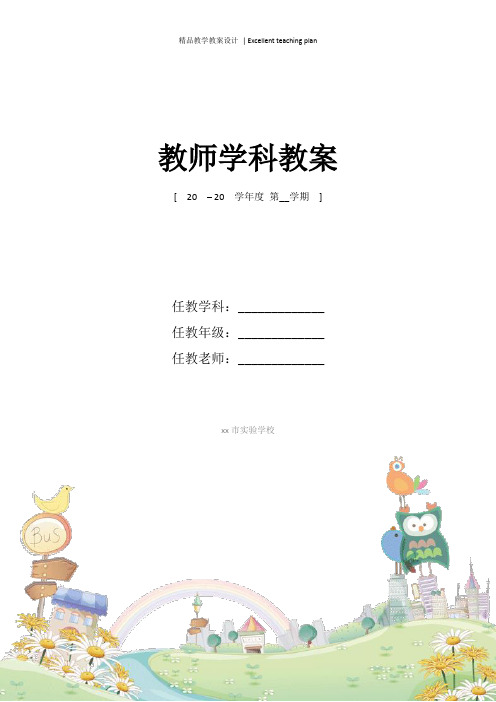
教师学科教案[ 20 – 20 学年度第__学期]任教学科:_____________任教年级:_____________任教老师:_____________xx市实验学校Module 9 Unit 2 教案2一、准备阶段Ⅰ教学目标情感目标:培养学生学习英语的兴趣。
知识目标:学习句型I`m going to do the high jump. I`m going to do the long jump..能力目标:培养学生制定计划并进行谈论的能力。
Ⅱ教学重点1.学习句型I`m going to…2.掌握单词及词组:Do the high jump/ do the long jump/ run the 100meters/ run the 200 meters3.学习韵律小诗I`m training for Sports Day.Ⅲ教学难点能够区分运用jump high/ do the high jump; Jump far/ do the long jumpⅣ辅助资源挂图、录音机、磁带、图片二、教学过程I. Warming up唱歌曲We are going to go to the zoo.II. Revision1. Do duty report and free talk.2.以小组为单位,分角色进行表演Module 9 Unit 1中的课文。
(在类似小短剧的表演中,开始了新的一课学习,不仅检验了上节课的作业完成情况,还可以有效的调动学生学习英语的热情。
)III. Presentation:1. 出示Daming/ Amy/ Sam/ Lingling的头像,教师介绍”Daming is going to run the100meters for Sports Day. But what are Sam/ Amy/ Lingling/ Daming going to do for Sports Day?(开门见山导入课文,便于学生学习掌握教学的重、难点)2. 看课文挂图听录音,回答教师在上一个环节中提出的问题:“Sam is going to do the long jump.Amy is going to do the high jump.Lingling i s going to run the 200 meters.”3. 区分do the high jump 和jump high“Amy can jump high. So she is going to do the high jump for Sports Day.”重点讲解jump 的不同含义。
Unit2My week( A Let's learn)教案新部编本.
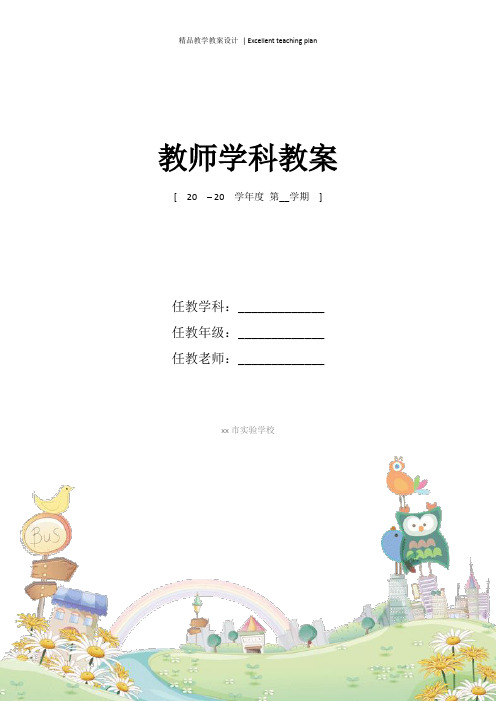
教师学科教案[ 20 – 20 学年度第__学期]任教学科:_____________任教年级:_____________任教老师:_____________xx市实验学校Lesson planningUnit 2: My week ( A Let's learn)I .Background information1. Grade: grade five primary school2. Teaching material: GO FOR IT. Lesson two “My week”II. Teaching aimBy the end of this class, students should be able to1. Learn to new words2. Learn to talk about my days of the week..3. Know what do you have on…III. Teaching contents1. Learning to new words.(Monday, Tuesday, Wednesday and so on)ing the sentence patterns: what day is it today?It’s mondayWhat do you have on Monday ?We have …IV. Teaching main difficult point1.key words and phrases: walk, on foot, by bike/bus/train/plane2.Sentence patterns: l. what day is it today?2. What do you have on Monday ?V. Teaching aidsMulti-media microphneVI. Teaching methodsmunicate language teaching.(CLT)2.Task-based language speaking(TBLT/TBL)3.PPP language teaching(3P)VII. Teaching procedures1.lead—in1). greeting:T: Good morning. Pretty boys and girlsSs: Good morning.T: How are you today?Ss: I’m fine.T: I’m fine, too.2). Let’s sing (Hello song).3) Listening a song (day of week)Today, we’re talk about My days of the week .2. Presentation (pictures)1) New words: Monday, Tuesday, Wednesday and so on2) Let’ play a game. Monday –Friday (secret gift)3) Listening a song (day of week)4) sentence patterns: l. what day is it today?2. What do you have on Monday3. Practice1) Ask individual SsT: what day is it today?S: It’s …T: What do you have on Monday ?S: We have …2) Students dialogue——what day is it today?——It’s …——What do you have on Monday ?——We have …4.production一.连词成句1. day is what it today2. what have on you do Monday3. have art P.E. we and math4. is today friday二.选择(1). What day is it today?A. It’s MondayB. It’s Wednesday(2) What do you have _____Wednesday.A. onB. inVIII. Homework选一道你自己喜欢的题目来做。
北师大版英语八年级上册Unit2Lesson4ClassProjects(第二课时)教学设计

-搜集关于班级项目评价的实例,以便课堂讨论和分享。
5.家长参与:鼓励学生与家长分享本节课的学习内容,让家长了解孩子的学习进度和成果。要求:
-学生向家长介绍班级项目的主题和进展;
-家长提出建议和鼓励,共同关注孩子的成长。
要求:每个小组成员都要参与讨论和展示,确保口语表达的准确性和流利性。
3.词汇积累:请学生课后复习本节课所学的重点词汇和句型,并尝试用它们造句。要求:
-每个词汇造两个句子,一个一般现在时,一个一般过去时;
-每个句型至少使用一次;
-课后来教室展示,与同学分享学习成果。
4.预习作业:请学生预习下一节课的内容,提前了解关于班级项目评价的相关知识。要求:
-通过课堂观察、作业批改、小组评价等手段,全面了解学生的学习情况,及时调整教学策略。
4.教学拓展:
-鼓励学生在课后继续完善班级项目,将所学知识运用到实际生活中。
-建议学生关注国内外类似项目的发展动态,拓宽视野,提高英语素养。
四、教学内容与过程
(一)导入新课
1.教学活动设计:教师通过展示一组班级项目的图片,如环保活动、爱心义卖、英语角等,引导学生关注并思考以下问题:“What are these pictures about? Have you ever taken part in any class projects? What did you do in the projects?”
2.难点:如何引导学生将所学的语法知识、词汇和句型有效地运用到实际的项目描述中;如何在小组合作中平衡学生的参与度和成果的展示。
-通过案例分析、模仿练习等方式,降低学生运用英语描述项目的难度。
-设计分层教学活动,确保不同水平的学生都能参与到项目讨论和展示中。
人教版八年级英语上册-Unit2-教案
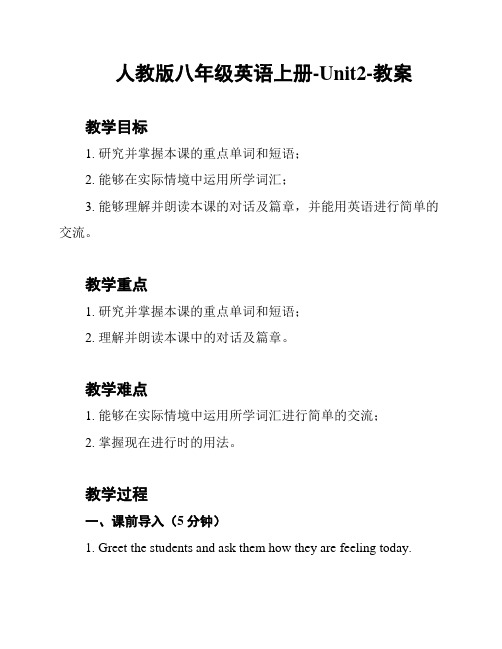
人教版八年级英语上册-Unit2-教案教学目标1. 研究并掌握本课的重点单词和短语;2. 能够在实际情境中运用所学词汇;3. 能够理解并朗读本课的对话及篇章,并能用英语进行简单的交流。
教学重点1. 研究并掌握本课的重点单词和短语;2. 理解并朗读本课中的对话及篇章。
教学难点1. 能够在实际情境中运用所学词汇进行简单的交流;2. 掌握现在进行时的用法。
教学过程一、课前导入(5分钟)1. Greet the students and ask them how they are feeling today.2. Show some pictures on the screen and try to ask them what the pictures are about.二、自主研究(35分钟)1. 学生们自主研究课文,并做好笔记,记录不熟悉的内容和需要了解的疑点。
2. 学生们可以在自主研究的过程中互相讨论并互相帮助。
三、交流展示(15分钟)1. 当做完自主研究后,老师开始组织学生展示他们的研究成果,展示方式并不限定,有朗读、问答等,总之要把研究到的知识用出来,让知识得到巩固。
2. 学生们可以相互交换信息或者反馈,梳理研究内容,发现问题。
四、课堂总结(5分钟)1. 了解本节课的教学内容,培养学生研究语言的兴趣。
2. 学生们要及时复和总结,才能让这些知识真正掌握。
教学板书设计1. 本课的重点单词和短语。
2. Was he doing exercise? Yes, he was.课后作业1. 完成本课课后的题。
2. 总结课上学到的内容。
人教版八年级上册英语单元教案(含教材分析)--Unit2

⼈教版⼋年级上册英语单元教案(含教材分析)--Unit2Unit 2How often do you exercise?本单元的教学内容围绕“多久做⼀次运动”这⼀话题展开。
Section A是基本语⾔内容的收集和学习,这⼀部分引导学⽣通过本课的语⾔素材进⾏看图说话、句型演练、实际描述,通过对话表演等使学⽣能够正确地使⽤表⽰做什么活动的词组,多久做⼀次的句型,从⽽熟练地谈论多久做⼀次活动。
Section B是知识的扩展和语⾔的综合运⽤,是在Section A的基础上,锻炼学⽣能够⾃如地谈论⾃⼰的⽣活习惯。
这些内容都是与学⽣⽇常⽣活紧密相关的,学⽣很熟悉,也乐于去说,因此在这⼀课题的教学过程中,应紧密联系学⽣⽣活实际,采⽤多种⽅式,以说为主,配合听的练习,最终以对话为途径,解决本课题的中⼼语句。
这易于引发学⽣学会运⽤简单的英语进⾏交际和交流,也对提⾼学⽣的综合能⼒,特别是说的能⼒很有帮助。
学⽣通过对本单元的学习,可以引导他们养成良好的⽣活习惯和饮⾷习惯,从⽽合理安排⾃⼰的各项⼯作,享受丰富多彩的校园⽣活。
第⼀课时Section A(1a-2d)Teaching Goals【教学⽬标】Key words:housework,hardly,ever,once,twice,Internet,program,full,swingKey phrases:how often,on weekends,go to the movies,help with housework,hardly ever,go shopping,once/twice a week/a month,swing danceKey sentences:1.What do you usually do on weekends?I often go to the movies.2.How often do you watch TV?I watch TV every day.Teaching Key Points【教学重点】The vocabulary:housework,hardly,ever,once,twice,how often,on weekends,go to the movies,go shopping,help with housework,once/twice/three times a week/a month Target language:What do you usually do on weekends?I often go to the movies. Does he go shopping?No,he never goes shopping. How often do you have piano lessons?Twice a week,on Wednesday and Friday.Teaching Difficult Points【教学难点】1.The adverbs of frequency:always,usually,often,sometimes,hardly ever,never2.Target language above.Teaching Aids【教学⼯具】An English textbook,a tape recorder,CAI or courseware.Teaching Steps【教学过程】★Step 1Leading in1.Greetings:Talk about something the students did on summer vacation.2.Check the homework.★Step 2Pre-taskPage 9,1a.1.Look at the picture.2.Name each activity.T:What are they doing?S:They are shopping/reading/exercising/watching TV/helping with housework.(Help the students to answer.)3.Write the activities on the line.4.Check the answers on the board.5.Practice reading.Page 9,1c.1.Focus on the conversation in the box.2.Practice reading.3.Pair-work:What do you do on weekends?I...4.Group-work:Divide the class into groups of four or five. Make conversations. First S1 to S2:S1:What do you do on weekends?S2:I...S1:What does she/he do on weekends?S2:She/He...5.Act out their own dialogues.★Step 3While-taskPage 9,1b.1.Look at each picture above 1a.Tell what the person does on weekends. Check the Ss orally.2.Make sure what they will hear and do.3.Read these adverbs and explain.4.Play the tape twice. Write the letters on the line.Page 10,2a & 2b.1.Read the activities and the answers of “how often” first.2.Practice reading.3.In 2a we should know the activities you hear. In 2b we should know the answers of how often he does the activities. 4.Play the tape for the first time. Ss only listen.5.Play the tape a second time. Ss do 2a.6.Play the tape a third time. Check the answers.7.Play the tape. Ss do 2b.8.Check the answers.In this part,we should pay attention to “how often” cause of special questions and answers.★Step 4Post-taskPage 10,2c & 2d.1.Focus on the conversation in 2c first.2.Practice reading.3.Read the activities in the left box.4.Fill in the chart.5.Pair-work:Make conversations.6.Make students scan the conversation in 2d.7.Teach and then make Ss role-play the conversation in pairs. In this part,student A will be Jack. Student B will be Claire. As they talk,move around to monitortheir work. Offer language or pronunciation support as needed.8.Have a group of students present their conversation to the class.★Step 5Homework1.Practice the conversation in 2d.2.Do the exercises on Page 8 in students' book.Board Design板书设计Unit 2How often do you exercise?The first period Section A(1a-2d)1.Key vocabulary:housework,once,twice,full,how often,on weekends,go to the movies,help with housework,hardly ever,once a week,three times a month 2.表⽰动作的频率由⾼到低依次是always(100%),usually(80%),often(30%~50%),sometimes(20%),hardly ever(5%),never(0%)。
八年级英语上册Unit2第二课时SectionA(3a_3c)课件新版人教新目标版ppt

First,you must try to drink a lot of water every day.__19__ say that people should drink more than eight cups of water a day.__20__ can keep you away from illnesses (疾病).
C.one or twice
D.once or twice
( B )14.It's a small house but ________ there's a garden. So I'll buy it.
A.in the end
B.at least
C.of course
D.such as
( D )15.—Does he often ________?
Sleeping is also very __25__.When you sleep,you can have a good rest (休息).Getting a good sleep every night can make you feel well.
( B )16.A.want
B.think
Unit 2 How often do you exercise?
第二课时 Section A (3a3c)
一、根据句意,用方框中所给单词的适当形式填空。
always usually often sometimes never 1.—How ___o_f_te_n__do they visit Happy Farm?
二、用方框中所给短语的正确形式填空。 keep healthy on weekends help with
- 1、下载文档前请自行甄别文档内容的完整性,平台不提供额外的编辑、内容补充、找答案等附加服务。
- 2、"仅部分预览"的文档,不可在线预览部分如存在完整性等问题,可反馈申请退款(可完整预览的文档不适用该条件!)。
- 3、如文档侵犯您的权益,请联系客服反馈,我们会尽快为您处理(人工客服工作时间:9:00-18:30)。
教师学科教案[ 20 – 20 学年度第__学期]
任教学科:_____________
任教年级:_____________
任教老师:_____________
xx市实验学校
Unit 2 How often do you exercise?
The Second Period
Section A (Grammar Focus-3c)
I. Teaching aims:
1.Knowledge aims:
(1)Key words: maybe ,least
(2)Key phrases: at least, once a month, stay up late,twice a week,eat a healthy breakfast,go to bed,play sports,after school
(3)Important sentences:
①—What do you usually do on weekends?
—I always exercise.
②—How often do you go to the movies?
—Once a month.
2.Ability aims: Learn the usage of frequency words.
3.Emotion aims: Encourage students to take part in more activities.
II. Important points: Learn to make se ntences using “how often”.
III. Difficult points: Grasp the usage of frequency words.
IV. Teaching process
Step 1 Leading in
1 .Greetings.
2. Drills:
T: What do you usually do on weekends?
S1: I usually play soccer.
T: How often do you play soccer?
S1: I play soccer twice a week.
T: How often does he play soccer?
The other Ss: He plays soccer twice a week.
Repeat for three times.
Step 2Pre-task
Page 11,Grammar Focus.
1. Review the grammar box. Ss say the questions and answers.
2. Practice reading.
Step 3 Finish 3a-3c
3a Complete the questions with do or does. Then match the questions and answers.
3b Use the words given to write questions. Then ask and answer them with a partner.
3c Group work
What can you do to improve your English? Ask your classmates the questions and find the best English student.
A: How often do you read English books?
B: I read English books about twice a week.
Role-play the conversation.
Language points
1.I go to the movies maybe once a month.我大概每月去看一次电影。
(1)go to the movies意为“去看电影”。
I went to the movies last night.我昨晚去看电影了。
(2)maybe副词,意为“或许;大概;可能”,常位于句首。
Maybe he knows the way to the park.或许他知道去公园的路。
辨析:maybe与may be
①maybe副词,作状语,意为“或许;大概;可能”。
Maybe you are right.也许你是对的。
②may be属于“情态动词+be动词”结构,意为“可能是”。
You may be right.你也许是对的。
2.How often do they stay up late?他们多久熬一次夜?stay up late意为“熬夜到很晚”。
It is not a good habit to stay up late.熬夜不是个好习惯。
Don’t stay up late next time.下次不要再熬夜到很晚了。
3.He plays at least twice a week.他至少每周踢两次(球)。
4.at least意为“至少”。
其反义短语为at most,意为“最多”。
There are at least 1,500 students in our school.我们学校至少有1,500名学生。
It will take me at least 20 minutes to get to school.到达学校至少要花费我20分钟。
语法拓展
频度副词的用法
1.概念
频度副词是表示事情发生频率的副词,即用来表示某事在一段时间内发生的次数。
常见的频度副词有:always, usually, often, sometimes, hardly ever, hardly, never, almost 等。
2.频度副词的位置
频度副词一般位于be 动词、助动词或情态动词之后,实义动词之前。
其中sometimes位置比较灵活,可位于句首、句中或句末。
Sometimes he goes to the movies on Friday evening.他有时周五晚上去看电影。
【注意】对频度副词提问用how often。
—How often do you shop on line, Mandy?曼迪,你多久网购一次?
—I hardly ever shop online.我几乎从不网购。
Exercise
句型转换
1.I usually go shopping on weekends. (变为一般疑问句)
_____ you usually _____ shopping on weekends?
2. She often helps with housework at home. (同上)
_____ she often ______ with housework?
3. They visit their grandparents once a month. (就划线部分提问)
_____ _____ _____ they visit their grandparents?
4. She always watch TV after dinner. (就划线部分提问)
_____ _____ _____ she ______ TV after dinner?
5.Maybe your mother is in the kitchen. (改为同义句)
Your mother ____ ____ in the kitchen.
Step 4 Summary
1.Key vocabulary:maybe,at least,once a month,stay up,
twice a week
2.Target language:
A:How often do you read English books?
B:I read English books about twice a week.
Homework
1.Listen and read the sentences in Grammar Focus aloud.
2.Practice the conversation using the sentences in Grammar Focus.
板书设计
Unit 2 How often do you exercise?
The Second Period
Section A (Grammar Focus-3c)
①—What do you usually do on weekends?
—I always exercise.
②—How often do you go to the movies?
—Once a month.
教学反思:通过复习运用频率词汇及询问活动频率。
教育学生养成健康的饮食习惯,保证充足的睡眠时间,进行合理的运动锻炼,以保持健康的体魄。
培养学生的逻辑表述能力,激发学生的积极思维,并使学生互相了解,增进友谊,加强人际交往,以形成良好的人际关系。
2016年9月14日
田春。
